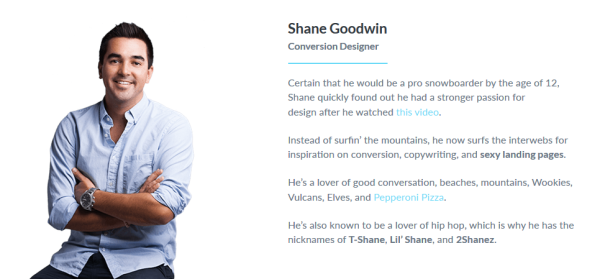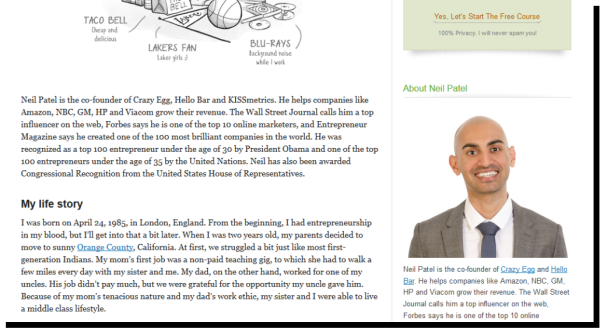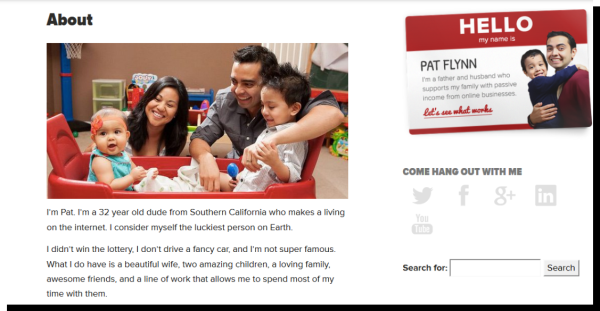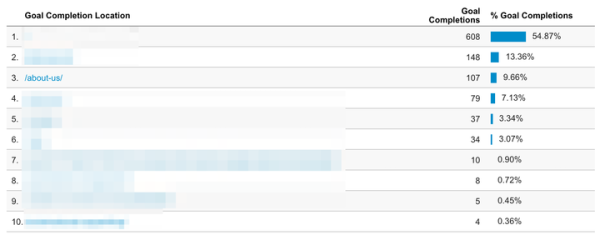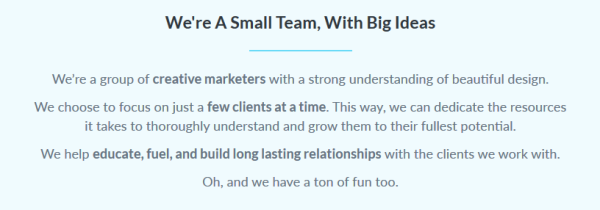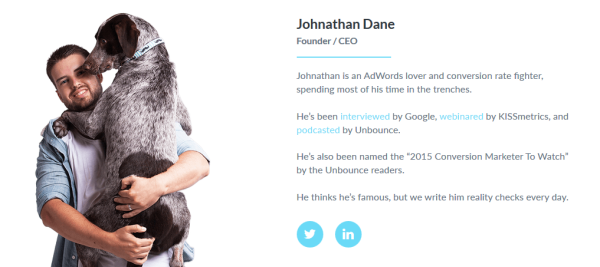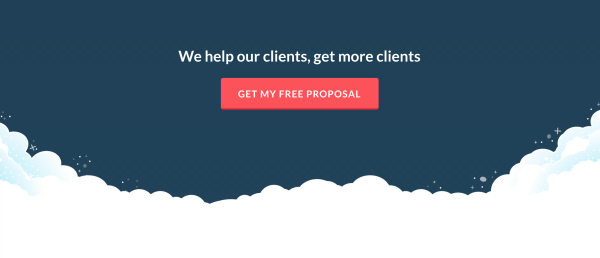What are you trying to accomplish with your About Page?
That’s an important question to ask for any page on your website, but we typically have an answer for most website pages.
- Landing pages: Convert, convert, convert!
- Service pages: Educate and convert
- Contact page: Make it easy for the right people to contact you
- Resource pages: Establish your brand as topical authority
- Blog: Attract and convert inbound traffic
But what about your About Page? What is its purpose?
Get brand new marketing strategies straight to your inbox. 23,739 people already are!
The About Page: Getting To Know You (Hopefully)
Anytime I visit a new website and enjoy the content, I click on the About Page to learn what these folks are all about.
Is this another inexperienced guy trying to con me into giving him money?
Or another mommy blog spouting unbacked opinions on random topics?
Is this another mediocre service business hoping to reel in the uneducated?
Or is this someone who actually knows what they’re doing?
Is this a business that has succeeded with top-level clients?
Does this site’s purpose resonate with me?
The About Page will be your first real introduction to incoming visitors.
Your content is like a screening process, where visitors decide if they are even interested in getting to know you. But once they’ve clicked on your About Page, they’ve decided they’d like to meet you and see what you’re all about.
What will they find?
Before we talk about what they should find, let’s take a moment and discuss what they shouldn’t find.
Two Things That Should NEVER Appear On Your About Page
There are two things I see repeatedly on About Us pages that simply boggle my mind.
1) Generic Wording
If there was ever a place to be personable and unique, it’s your About Page. Having an About Page is basically a license to have a personality.
You don’t need to be crazy. You just need to be you.
Why?
Because YOU are the primary difference between the 400 other businesses that allegedly offer the same thing you do.
Maybe you need your landing pages to be strictly formal and professional. I’ve worked with a bunch of lawyers. I understand. But there is no reason your About Page needs to read like this:
“Captain James T. Kirk has been operating the USS Enterprise for the last 15 years. He has vast experience in starship piloting, deep space discovery, and team leadership. Captain Kirk and his industry-leading team can provide quality transportation for all interplanetary commerce in Sector 7.”
Want to know how to make space-themed science fiction boring?
Generic wording.
Write with some personality. At a minimum, write like someone is actually going to read it.
You don’t need to pretend to be anything. If you have a dry personality, that’s okay. Simply write like you are talking to someone who wants to get to know you.
2) Direct Selling
Pretty much every spot on your website is a great point for direct selling... except your About Page.
Imagine this:
You go to a party. You’re having a fantastic time. There's a group conversation going about the acting abilities of Nicolas Cage.
Some guy you’ve never met mentions he once tried to get Cage to endorse his travel agency. The two of you begin a 1-to-1 conversation about the service industry.
You ask him where’s he from, where he’s living now and how his career got started.
He answers your questions quickly... and then starts pitching you on buying a timeshare.
Worst. Party. Ever.
Not awkward enough? How about this:
Your church friend invites you over to dinner. You’re pretty excited because you’ve been wanting to get to know her family for a while.
You show up. Wait, who are all these other people with similarly confused faces?
And then your friend walks out with a bag of Mary Kay...
The point is, when people are trying to get to know you, it’s a REALLY bad time to sell.
You can sell on your landing pages. Sell on your service pages. Sell anywhere you like.
But don’t sell openly on your About Page.
Yes, you are “selling” yourself with your About Page. You are presenting yourself in a way that makes you an attractive person or business to buy from.
But don’t use generic wording, and don’t attempt to sell directly via your About Us Page.
Three Types of About Pages For Three Types of Websites
Now that we’ve covered what not to do, let’s look at what we should do with our About pages.
I’ve come across three different types of highly compelling About pages, each fitting a different type of owner or business.
Don’t feel limited to these templates. Your About Page should introduce readers to you, rather than a fabricated persona.
These examples, however, can give you ideas and insights to create a meaningful page of your own.
Here are the three types of compelling About pages:
- I’m an expert with a story
- I’m on a journey just like you
- We’re a business with values
Let’s take a closer look at each one.
1) The “Expert With A Story” Approach
One of the best types of About pages is the “expert with a story” page, and there is no better example of this than Neil Patel.
Neil’s About Page on his QuickSprout blog is a fascinating case study in establishing expertise and bragging without making people, y’know, hate you.
After a hand-drawn image of Neil, the opening paragraph reads:
“Neil Patel is the co-founder of Crazy Egg, Hello Bar and KISSmetrics. He helps companies like Amazon, NBC, GM, HP, and Viacom grow their revenue.
The Wall Street Journal calls him a top influencer on the web, Forbes says he is one of the top 10 online marketers, and Entrepreneur Magazine says he created one of the 100 most brilliant companies in the world.
He was recognized as a top 100 entrepreneur under the age of 30 by President Obama and one of the top 100 entrepreneurs under the age of 35 by the United Nations. Neil has also been awarded Congressional Recognition from the United States House of Representatives.”
Wow. That was a mouthful. Amazon, NBC, GM, HP, Viacom, Wall Street Journal, Forbes, the United Nations, and President Obama.
Name drop much?
These lines are a brag and a half. The guy’s tagline is literally “I’m kind of a big deal,” borrowed from the comically narcissistic Ron Burgundy in the movie Anchorman.
But guess what? No one really minds. If you were to land on this About Page and read through all of the social proof, you would not in any way be annoyed by this arrogant dude named Neil.
Why Bragging Works (Sometimes)
- It’s an About Page. You are supposed to talk about yourself.
- It’s written in the third person. (The rest of the page isn’t, but the braggiest part is.)
- Neil follows up this paragraph immediately with a sincerely written life story.
Neil starts by establishing that he is, in fact, an expert. This is important because it immediately makes the reader interested in learning more.
We all want to be experts, so when we realize that someone is an indisputable expert, we want to learn how they got there.
Of course, if you stop at expertise, you’re just bragging. If you're an expert with a story, however, you become intriguing.
Neil’s story isn’t particularly compelling as far as success stories go. And that’s the point.
It’s not designed to be turned into a Lifetime movie. Neil's story sells you on the idea that he's naturally good at what he does while creating goodwill in his status as a normal guy -- a guy who has identified and capitalized on his sweet spot and wants to share that expertise with you.
So, to summarize:
Step 1. Establish your expertise.
Step 2. Tell your story.
Anyone with a level of expertise can do this. Businesses can as well.
You don’t have to have the most compelling story. And it’s okay if you aren’t the best in the world.
You just need to have some level of demonstrable expertise, and you have to be willing to honestly tell the story of how you arrived where you are today.
2) The “Just Like You” Approach
Another fantastic About Page relies on the “everyman” appeal. You aren’t an expert. You're just like your audience, but perhaps a few steps ahead of them in your journey.
A great example of this is Pat Flynn’s About Page on his blog Smart Passive Income.
Pat is currently making over $100k per month. He is wildly famous in terms of online personalities. So why do his first two paragraphs underplay all that?
The reason is that Pat has kept essentially the same “About” message he has had since the beginning, when he was making $5k per month.
If you were to have checked Pat’s blog years ago (I did), you would have found basically the same message you will find today.
To summarize:
“I’m a normal guy with a family who is trying to figure out how to make passive income online. After getting laid off from my job as an architect, I’m trying everything I can to make this online thing work for me.
“I’m the crash dummy for your success. Follow along with me as we see what works and what doesn’t!”
Make The Journey Relatable -- And Profitable
The best part is that Pat’s income actually reflects this “follow along with me” message. While Neil makes most of his money from his businesses and consultations -- what you would expect from an expert -- Pat makes over 70% of his revenue via affiliate earnings from products he uses for his online business.
In other words, he makes most of his money from trying something, telling everyone if it works, and then having it work for them over the long haul.
The “just like you, on a journey” strategy works very well for About pages. It creates an instant connection with the reader and starts the relationship on a foundation of
trust and mutual respect.
Like the expert page, it’s still important to mention achievements, but you should underplay them in the “just like you” approach. Bragging can destroy the connection.
As a final note, while this approach is ideally suited for individuals, it can work for businesses as well -- but only small to mid-sized businesses.
No one will buy the “just like you” approach from a Google-sized corporation.
3) The “Business With Values” Approach
Unlike individual bloggers or small businesses, it’s hard for mid to large sized businesses to connect with customers via personal stories.
There’s really nothing cute or compelling about the story of a 500-person business (at least most 500-person businesses I’ve encountered). It’s a business; it makes money. It pays people to say stuff about it.
And while you might not connect with a personal story, you CAN get people to resonate with your company culture.
The best example I’ve seen of this strategy is Buffer.
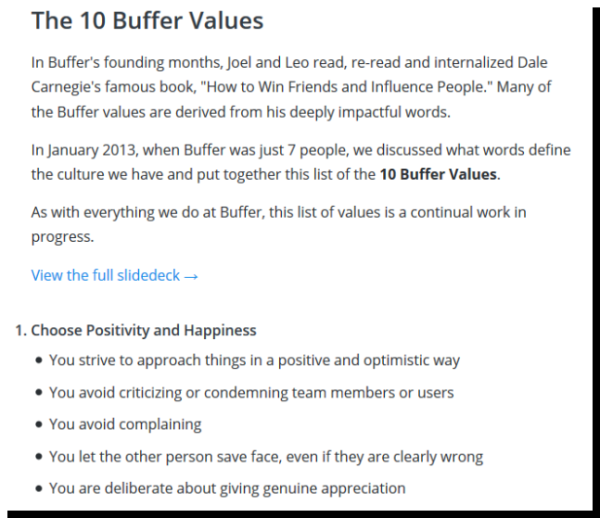
Buffer has become as well known for the way they do business as they are for their SaaS offering. They preach transparency everywhere they go, and the numbers back up their professed company values.
When you read Buffer’s About Page, or any one of their blog posts not focused on social media marketing, you will immediately see concepts like enjoyable work life, positivity, transparent business operations, and team-first thinking.
Why?
When Buffer makes a big deal about its core values, anyone who shares those values begins paying attention.
If you wish work was more enjoyable, you start paying attention.
Anyone who feels like their employers are a bit shady starts paying attention.
And if Buffer’s positive thinking resonates, you start paying attention.
Buffer makes a social media app. There is nothing inherently personal, emotional, or meaningful about that reality.
But by becoming a “Business With Values”, specific values that aren’t business-as-usual, Buffer has made it easier for thousands of users to resonate with its vision in a meaningful way.
About Pages That “Convert”
So what should you include on your unique About Page?
Despite our recommendation to avoid selling, your About Page can actually be a big-time converter. Here at KlientBoost, it’s the third-highest converting page on our site.
Looking at this page and hundreds of other successful About pages, we can see that every About Page should include the following:
- Identity & Purpose
- Personality
- Credentials
- Call To Action
1) Communicate Your Identity & Purpose
Some people call it their mission statement. Others call it their core values.
Regardless of the name, you must communicate what your business does and why you do it somewhere on this page.
2) Communicate With Personality
As we mentioned before, your About Page should have personality. But if you aren't funny, don’t try to be a comedian. You don’t have to be suave. You just have to be you.
3) Mention Your Credentials
You’ll notice in the above image that Johnathan is somewhat humorously being introduced while the copy is making sure to mention his awards and the times his expertise has been called upon by recognizable brands.
Be sure to mention what you are noteworthy on your About Page.
4) Include A Call To Action
Don’t sell at any point on your About Page. In the end, however, give users the option to continue their relationship with you with a non-sales-y CTA.
Your About Page: Introduce, Relate, Connect
Whatever approach you take, don’t waste your About Page. It’s far more important than the marketing attention it receives might suggest.
The purpose of the About Page is to introduce people to your business.
It’s to start a relationship. It’s to make a meaningful connection.
Before we conclude, I’d like to clarify that your About Page isn’t enough to be seen as an “Expert With A Story”, a “Just Like You” guide, or a “Business With Value”. You have to back that approach up in everything you do.
For Neil Patel, that looks like kicking ass with international brands, sharing the results, and giving away free resources.
Pat Flynn does it by constantly experimenting and doing it with humility, class, and a complete lack of condescension.
For Buffer, that looks like open salaries and very personal, very transparent blog posts from its founders.
Now it’s your turn. How can you improve your About Page to better connect with new viewers?
Let us know in the comments below. We aren't writing these posts just for kicks ;)
Did you like what you read here? Gain some insight? ![]() Tweet and post this to your peeps to share the wealth.
Tweet and post this to your peeps to share the wealth.
